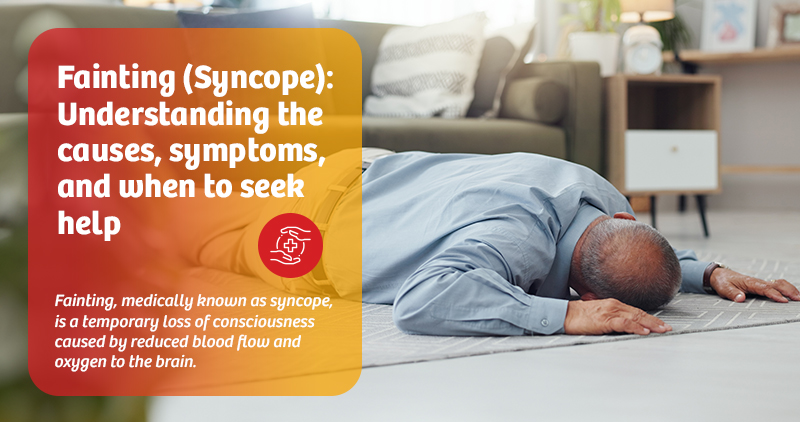

Fainting, medically known as syncope, is a temporary loss of consciousness caused by reduced blood flow and oxygen to the brain. It comes on suddenly, lasts for a few seconds, and recovery is usually quick.
It is often described as “blacking out” or “passing out”, and though most cases are harmless, sometimes fainting can indicate an underlying heart or neurological condition.
In India, fainting is commonly attributed to “low BP” or “weakness,” but the real causes can vary widely — from simple dehydration to serious cardiac issues.
The brain needs a constant supply of oxygen. If this supply drops, even briefly, consciousness is lost.
When you faint and fall, blood flow to the brain improves because your head is at the level of your heart — helping you regain consciousness.
Before fainting, you may experience
You usually regain awareness within 20 to 30 seconds, although you may experience mild fatigue afterwards.
Fainting can be triggered by various factors, from emotional stress to heart disease.
The main categories include
1. Vasovagal syncope (Common faint)
It is the most common cause of fainting, often triggered by emotional or physical stress.
Common situations include
It’s most common among teenagers and young adults, particularly females. Usually harmless, but identifying triggers helps prevent recurrence.
2. Orthostatic hypotension (Postural)
This type occurs when your blood pressure suddenly drops when you change position.
Causes include
Orthostatic hypotension can make you feel dizzy or faint immediately after standing.
3. Cardiac syncope (Heart-related fainting)
If a heart condition causes fainting, prompt medical attention is essential.
Possible causes include
Clues that fainting may be cardiac in origin
If you experience any of these, seek immediate medical help.
Fainting is very common — studies show up to 40% of people faint at least once in their lifetime.
Most people recover quickly.
If they don’t regain consciousness withinone minute, or show warning signs like chest pain, confusion, or jerky movements — call emergency services immediately.
You should consult a doctor if
Even a faint with injury or prolonged recovery requires medical attention.
Your doctor may
Order investigations such as
These help pinpoint whether fainting is due to heart, nervous system, or metabolic causes.
Other conditions that look like fainting include
Prolonged unconsciousness, confusion afterwards, or tongue-biting point towards causes other than simple fainting.
Most fainting episodes don’t need medication. Prevention focuses on lifestyle and awareness.
If your fainting episodes are linked to medication or a heart condition, your doctor will adjust your treatment as needed.
In India, if you experience recurrent fainting or blackouts, it’s advisable to avoid driving until you’ve been medically evaluated.
According to RTO and medical fitness regulations, drivers of heavy or commercial vehicles need to report such episodes.
Most people who faint have a good outcome, especially in common vasovagal or postural hypotension cases.
By recognising triggers, staying hydrated, and maintaining a balanced lifestyle, you can often prevent fainting spells altogether.
However, cardiac syncope can be serious — early diagnosis and timely treatment are key to preventing complications.
Leading cardiology care in Ahmedabad.
Fainting is your body’s warning sign that something has briefly disrupted blood flow to the brain.
While most cases are harmless, recurrent or unexplained fainting requires medical attention. Never ignore associated chest pain, palpitations, or loss of consciousness during activity.
At KD Hospital, our team of heart rhythm specialist, neurologists, and internal medicine specialists use advanced diagnostic tools — including ECG, holter monitoring, echocardiography, and tilt-table testing — to identify the root cause of fainting and provide targeted treatment.
If you or a loved one frequently experiences fainting spells or blackouts, consult our experts for a comprehensive evaluation and management.